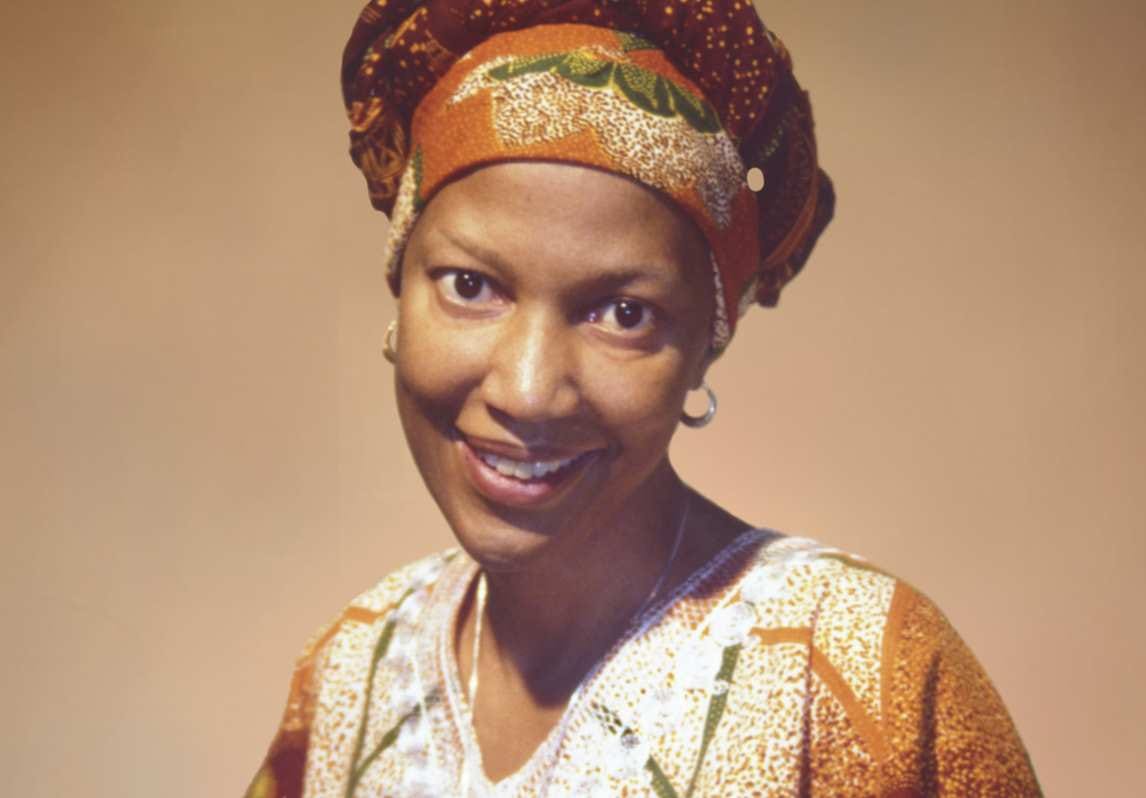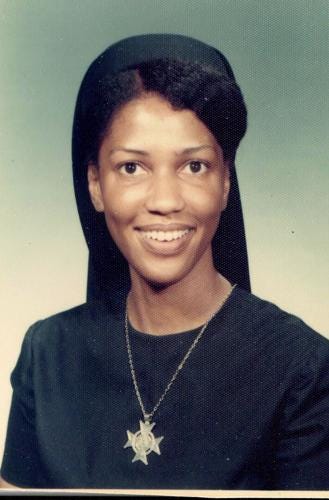I think the difference between me and some people is that I'm content to do my little bit. Sometimes people think they have to do big things in order to make change. But if each one would light a candle we'd have a tremendous light.
Advent Day 18: Thea Bowman (1937-1990)
One of the maxims of Christian life is that though we are many, in Christ we form one body, and each member belongs to all the others (Romans 12:3-8). When Paul wrote this, he was not talking about the body as shorthand for institutional church which did not exist until much later. Rather, he was pointing us to the mystical proposition that it is in loving relationship where we have the opportunity to treasure and affirm who we are while bringing our individual gifts to lay at the feet of the many, for the well-being of all.
One of the most powerful modern witnesses to Paul’s unitive vision was Thea Bowman.
Thea Bowman was born in 1937 in Yazoo City, Mississippi. Her mother was a teacher and her father a doctor who’d given up a chance to practice in New York in order to serve the Black community in the Jim Crow South where African-Americans were routinely denied medical care. Her parents were determined to give their daughter a quality education, no small feat in rigidly segregated Mississippi.
Though the Bowmans were Methodists, when Thea was nine her parents enrolled her in a Catholic school administered by the Franciscan Sisters of Perpetual Adoration. This was her first intimate experience with Catholics, and it made an indelible impression. She was drawn to the simple lives of the Franciscan sisters, the joy with which they lived, and their commitment to service.
I was drawn to examine and accept the Catholic faith because of the day-to-day lived witness of Catholic Christians who first loved me, then shared with me their stories, their values, and their beliefs…then invited me to share with them in community prayer and mission.
In 1947, with her parents’ permission, Thea was baptized into the Catholic faith. Five years later, she announced her intention to take vows. At age sixteen, she left Mississippi for a convent in Lacrosse, Wisconsin. As the only Black sister at her convent, and in an overwhelmingly White denomination, Thea brought her whole self rather than just blend in.
…I come to my church fully functioning…I bring myself, my Black self, all that I am, all that I have, all that I hope to become.
Thea had a powerful gift for preaching, teaching and singing. Over time, she became a popular speaker who imported elements of her Black Methodist childhood into the Catholic church—spirituals, hymns, dance and witnessing to the Spirit.
I bring my whole history, my traditions, my experience, my culture, my African-American song and dance and gesture and movement and teaching and preaching and healing and responsibility as a gift to the church…I bring a spirituality that . . . is contemplative and biblical and holistic, bringing to religion a totality of minds and imagination, of memory, of feeling and passion and emotion and intensity, of faith that is embodied, incarnate praise, a spirituality . . . that steps out in faith, that leans on the Lord, a spirituality that is communal, that tries to walk and talk and work and pray and play together. . .
She did this not only because she wanted Black Catholics to feel at home but because she believed African-American traditions had much to teach the church about resilience and community.
Today we’re called to walk together in a new way toward that land of promise and to celebrate who we are and whose we are. If we as church walk together, don’t let nobody separate you. That’s one thing Black folk can teach you. Don’t let folk divide you or put the lay folk over here and the clergy over here, [or] put the bishops in one room and the clergy in the other room, put the women over here and the men over here.
Throughout the sixties and seventies, Thea juggled teaching with her increasingly demanding speaking schedule. In 1980 she founded the Institute of Black Catholic Studies at Xavier University in New Orleans. She had hundreds of speaking engagements, carrying what she called her ministry of joy around the globe. She urged people to be who they were, with all their uniqueness, but to offer that uniqueness into the wider body of Christ. Her pure, unadulterated joy and her gift for fellowship always left audiences spellbound.
In 1984, Thea was diagnosed with breast cancer.
When I first found out, I didn’t know what to pray for. I didn’t know if I should pray for healing or life or death. Then I found peace in praying for what my folks call “God’s perfect will.” As it evolved, my prayer has become, “Lord, let me live until I die.” By that I mean I want to live, love, and serve fully until death comes.
She continued to speak through rounds of chemo. One of her final public appearances was before a conference of Catholic bishops. Frail and wheelchair-bound, she gifted them her lasting word.
The church teaches us that the church is a family. It’s a family of families and the family got to stay together. We know that if we do stay together, if we walk and talk and work and play and stand together in Jesus’ name, we’ll be who we say we are, truly catholic; and we shall overcome—overcome the poverty, overcome the loneliness, overcome the alienation, and build together a holy city, a new Jerusalem, a city set apart where they’ll know we are His because we love one another.
Thea Bowman died on March 30, 1990 at the age of fifty-two. She was buried next to her parents in Memphis. The words She Tried are inscribed on her tombstone.
Practice
Thea Bowman blessed the world with her uninhibited joy and gratitude. Like Therese of Lisieux, she was a believer in the little way of making change through ordinary, everyday living. In honor of Thea, today let’s combine ordinary joyous action with grateful contemplation. For the action, joyously commit a random act of kindness—a gesture, word or deed. For the contemplation, practice the ancient Jewish tradition of blessing people, places and things as you move through your day. This practice, found in the Talmud, mandates Jews to bless 100 things a day. See if you can make it to 100! It’s easier than you think, but it does take intention, as a true blessing is not just saying words, but giving whatever you’re blessing your full honor and presence, even if only for a few seconds. By blessing, you open a pathway to seeing the divine in things you might ordinarily miss.
Holiday Happenings at Life In The City
Dec. 11, 11:15 am: LITC’s original musical, Make Room In Your Heart.
Dec. 21, 7:30 pm: Blue Christmas, an intimate service for the longest night of the year.
Dec. 23, 7:00 pm: Our annual Christmas Eve-Eve service.
Dec. 25, 11:15 am: Celebrate Christmas morning with your church family.
Jan 1, 11:15 am: A quiet, contemplative service to welcome 2023.
Catch Up On Recent Posts
Read the Introduction to The Heart Moves Toward Light: Advent With The Mystics, Saints and Prophets.
Recent posts can be found in our Archive.






Thanks for the introduction to Thea Bowman! I’d never heard of her before!